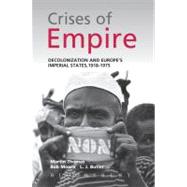
| List of maps | p. vii |
| List of abbreviations | p. viii |
| Preface | p. xiii |
| Introduction: Constructions of decolonization | p. 1 |
| British Decolonization | |
| The British Empire, 1918-1945: Interwar change and wartime pressures | p. 17 |
| The first wave of British decolonization: Commonwealth territories, south Asia and the Gold Coast, 1945-1951 | p. 47 |
| British decolonization, insurgency and strategic reverse: The Middle East, Africa and Malaya, 1951-1957 | p. 73 |
| Winds of change: The final waves of British decolonization in Africa and Asia after 1957 | p. 97 |
| French Decolonization | |
| The roots of French decolonization: Ideas, economics and reform, 1900-1946 | p. 127 |
| Decolonizing the French African federations after 1945 | p. 152 |
| People's war and the collapse of French Indochina, 1945-1954 | p. 182 |
| From French North Africa to Maghreb independence: Decolonization in Morocco, Tunisia and Algeria, 1945-1956 | p. 209 |
| Algeria's violent struggle for independence | p. 228 |
| Territories apart: Madagascar, the Togo trusteeship and French island territories | p. 252 |
| Dutch Decolonization | |
| An 'ethical imperialism'? The Dutch colonial empire before 1945 | p. 273 |
| Indonesia: The politics of delusion, 1940-1947 | p. 290 |
| Indonesia: The realities of diplomacy | p. 318 |
| Unfinished business: New Guinea as a last outpost of empire | p. 345 |
| Decolonization by default: Dutch disengagement in Suriname | p. 364 |
| Contrasting Patterns of Decolonization | |
| Contrasting patterns of decolonization: Belgian and Portuguese Africa | p. 385 |
| Conclusion: Changing attitudes to the end of empire | p. 411 |
| Select bibliography | p. 429 |
| Index | p. 441 |
| Table of Contents provided by Ingram. All Rights Reserved. |
The New copy of this book will include any supplemental materials advertised. Please check the title of the book to determine if it should include any access cards, study guides, lab manuals, CDs, etc.
The Used, Rental and eBook copies of this book are not guaranteed to include any supplemental materials. Typically, only the book itself is included. This is true even if the title states it includes any access cards, study guides, lab manuals, CDs, etc.